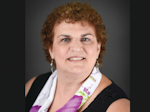"Oy, don’t get old!” An elder patient who sat in my chair often said this to me. As a young clinician I smiled and thought, “You should feel lucky to be alive.” As I aged, my point of view became more compassionate. I started to understand the challenges this segment of the population often faces.
After reading Dying from Dirty Teeth by Angie Stone, I understood the plight of senior citizens. In her book, Stone details the neglect and downward spiral people are subjected to if they are unable to maintain their oral hygiene. The problem is endemic to the system and typical of most eldercare facilities. This book discusses ideas for improving the quality of life for people who need assistance with daily living skills—namely, oral care. Stone also has a video, "Angie Stone oral care protocol," that describes the oral health protocol that she has developed for improving the oral health of dependent adults. Take a moment to watch it here.
As director of the dental hygiene program at Rowan College at Burlington County, New Jersey, (I’m now newly retired), I knew that involving students in a nursing home outreach project could benefit all involved. I brainstormed the idea with full-time faculty member Faith Zimnes, and the college’s public health instructor, Jean Rath. We discussed potential projects and decided it would be best to involve students during their final semester. We were interested in an oral care project and chose to follow Angie Stone’s model. Instructor Karen Vidovich volunteered to act as liaison and supervise students during their rotations.
Students were required to read Dying from Dirty Teeth during their winter break. This was a simple way to get them acclimated to the culture of nursing home care, become aware of oral care challenges, and understand what their tasks would be. We found an area retirement community that agreed to have dental hygiene students work with them on an oral care project for their residents. We outlined a program that mirrored the one in Dying from Dirty Teeth, and students rotated through the facility to floss and brush residents’ teeth once a week.
Some students were excited about helping seniors, and others were anxious about visiting a nursing home. I hoped the project would help them develop more compassion for this population than I’d had at their age. We expected the residents—our patients—would benefit from the attention, care, overall health, and social and psychological improvements of regular oral care. We also planned to educate the nursing staff about the hows and whys of providing these services daily.
The challenges
Educating the staff turned into one of our biggest challenges. Please note that this article is not about lazy or neglectful staff. They are dedicated professionals who are often overwhelmed with the ever-growing list of services that their patients require. However, rarely were students able to gather a group of staff members to share important information and demonstrations.
Another stumbling block was implementing the use of xylitol products. This difficulty was related to the patients’ medical conditions. All of the clientele had been documented as having swallowing difficulties, therefore, the xylitol gum and mints we had ordered were out of the question. We hadn’t anticipated this when we ordered the products for the project. Had we learned about this earlier, we would have ordered oral spray containing xylitol. But as it turned out, the order didn’t arrive before the project ended, so we didn’t use any xylitol products
The successes
My hopes for improving the students’ attitudes toward elderly patients were realized. Their impressions of the Saving Senior Smiles project ranged from initial apprehension to having an enjoyable experience. Many said it was eye-opening, positive, and informative. Some said that the project influenced their future career decisions. The students received positive feedback from both the clients and nursing home staff. The director of the community welcomed us with open arms and praised our efforts, and said she hopes we continue the project during future semesters.
We decided to change our approach for the next project. Many of the patients in the first group had received regular dental care, and their beginning plaque scores placed them in the average range. Therefore, there was not a large change in plaque scores over time. Prior to the next project, we will screen patients to ensure the students work with those who have the most need for improved oral health. This step will allow for better outcomes.
Screening patients will also avoid the issue of not having the appropriate xylitol products on hand. We will order products well in advance to ensure we have the best form of xylitol available. In the next program, using xylitol on a daily basis will likely improve the participants’ plaque scores. To address the challenges about educational sessions for the care staff, we will plan to attend regular staff meetings. Accommodating their schedules will better facilitate our educational goals.
Everyone involved declared the Saving Senior Smiles Project a success. The students’ exposure to this population, the widespread neglect of oral care in these facilities, and the gratitude of the facility staff and patients will ensure that Rowan College’s dental hygiene students continue this project. To fund future projects, students have learned how to write grants. The college’s grant writing department lent its expertise to the application process and how to research funding.
Saving Senior Smiles would not have been possible without Dying from Dirty Teeth and the support of the faculty at Rowan College at Burlington County, as well as the cooperation of the retirement community’s administration, staff, and residents. Many thanks to all involved with this pilot project, and I sincerely hope future projects have continued success.
Editor’s note: Find a link to a video with more in-depth information about Angie Stone’s oral care protocol in the online version of this article at rdhmag.com.
LINDA HECKER, MA, BS, RDH, CDA, is the original director of the dental hygiene program at Rowan College at Burlington County. She recently retired after more than 40 years as a clinical hygienist and educator. One of her areas of special interest is improving access to care for underserved populations.







